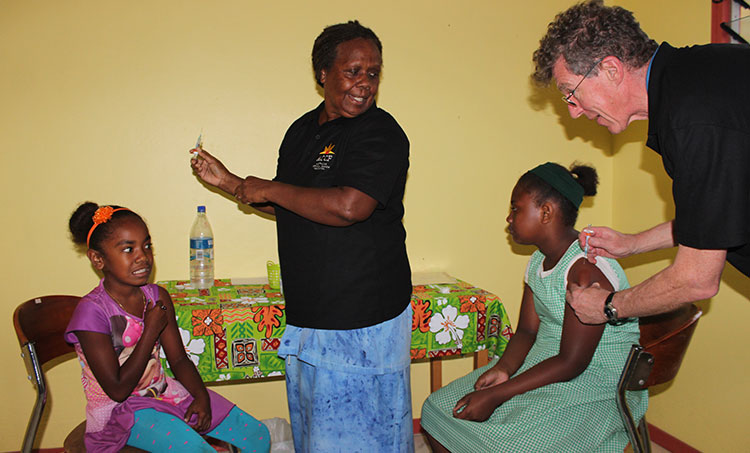News
Vaccine Program For Vanuatu Girls
Meeting Professor Ian Frazer, known as ‘the man that saved a million lives’, honestly felt a little daunting. To be able to step in to the world of a person that has had such a huge impact on women’s health on a global scale was unquestionably an honour and privilege.
July 14, 2016
Pacific Island Living
July 14, 2016Meeting Professor Ian Frazer, known as ‘the man that saved a million lives’, honestly felt a little daunting. To be able to step in to the world of a person that has had such a huge impact on women’s health on a global scale was unquestionably an honour and privilege.
Professor Ian Frazer, a regular visitor to Vanuatu is implementing two life changing programs to better women’s health – HPV vaccination for girls and HPV cervical screening for women. His end goal for Vanuatu is to reduce cervical cancer by vaccinating young girls and screening women for precancer to enable early treatment and cure.
Professor Frazer invented the Human Papilloma Virus (HPV) vaccine that protects against four HPV strains responsible for 70% of cervical cancers. An Australian of the Year recipient, Professor Frazer has received numerous awards for developing the technology for the vaccine.
The wide-ranging awareness the awards generated was more humbling than receiving any award, he said.
“You can make a difference through the research you are doing, (knowing) that it does have an impact and its raised awareness of medical research in Australia, that’s a good thing,” he modestly said.
“Medical research and health programs ensure we are investing in our future. If we can all think about putting money into these organisations we will ensure the betterment of our children’s future,” he claims.
“Obviously a healthier community is a more productive and happier community”.
Professor Frazer said as a close neighbour to Australia, it made sense to begin the pilot program in Vanuatu. He was alarmed to find in Vanuatu the numbers of cervical cancer cases were so high.
“The incidence of the disease is as higher in Vanuatu than almost anywhere else in the world, much higher than Australia, Europe and America.”
The need to help here became very apparent through the cervical cancer screening program that was initiated by the Australian Cervical Cancer Foundation.
The relevance to Vanuatu is enormous; it wasn’t a random chance that Vanuatu was the pilot for the vaccination program, a screening program had been carried in 2008 and the results were alarming.
One in a 100 healthy women in Vanuatu will develop cervical cancer, Professor Frazer says the problem in the developing world for the virus is far higher than the developed world.
“Awareness can be achieved relatively easily through schools,” he said.
At present the vaccination program is being run in schools throughout the country, additionally, vaccines are also being administered to young women at ‘catch up’ clinics.
Professor Frazer lives in hope it will get to a stage when all parents will know they can immunize their daughters against the virus that causes cervical cancer, that it’s nothing to be afraid of, which here in Vanuatu can be the biggest battle.
“Whoever is trusted within the community is the person that should be trusted with getting that information out,” he said.
“There is also the issue of lack of information cascading down from leaders to their respective communities in a way that will encourage parents to vaccinate.”
Professor Frazer said the program will run for five years and with the support of the Vanuatu Government he hopes to ensure it becomes a routine vaccine administered to all girls.
“The vaccine has been available in Australia for eight years with over 75% of girls and now boys being immunized, and what’s happened is the virus has now virtually disappeared” Professor Frazer said.
With its proven success in Australia the obvious goal is to duplicate its success elsewhere, meaning Vanuatu would rid itself of the virus and eventually the disease.
“The vaccine works, it’s safe and it’s available. Its just needs to be ensured all women get the chance to be vaccinated,” he said.
“One in a hundred women in Vanuatu will get cervical cancer; four of those hundred will have changes that will mean they could develop cancer, these women are the ones whose lives are being changed through the screening program, these women are being cured from the disease, it has immediate effect.”
Professor Frazer’s next move is to develop a strategy to roll out the project across other developing countries such as Papua New Guinea, Solomon Islands and Kiribati.
The challenge will be in supplying vaccines to these countries, however there are interested donors willing to participate.
The Australian Cervical Cancer Foundation aims to raise one million dollars to ensure women’s health in the long term is sustainable in Vanuatu and across the Pacific.
The ‘million dollar fund’ would mean that women’s health in Vanuatu would be a standalone from government. It would be enough money to fund the program in perpetuity, without relying on any other organisation to care for the women of Vanuatu.
“If one million sounds a little too big for your budget, then $100,000 is needed to set up the pathology lab to assist in cancer diagnosis in Vanuatu,” Dr. McAdam of the Foundation said.
For more information or to donate, go to www.accf.org.au
© 2024 Pacific Island Living Magazine all Rights Reserved
Website by Power Marketing